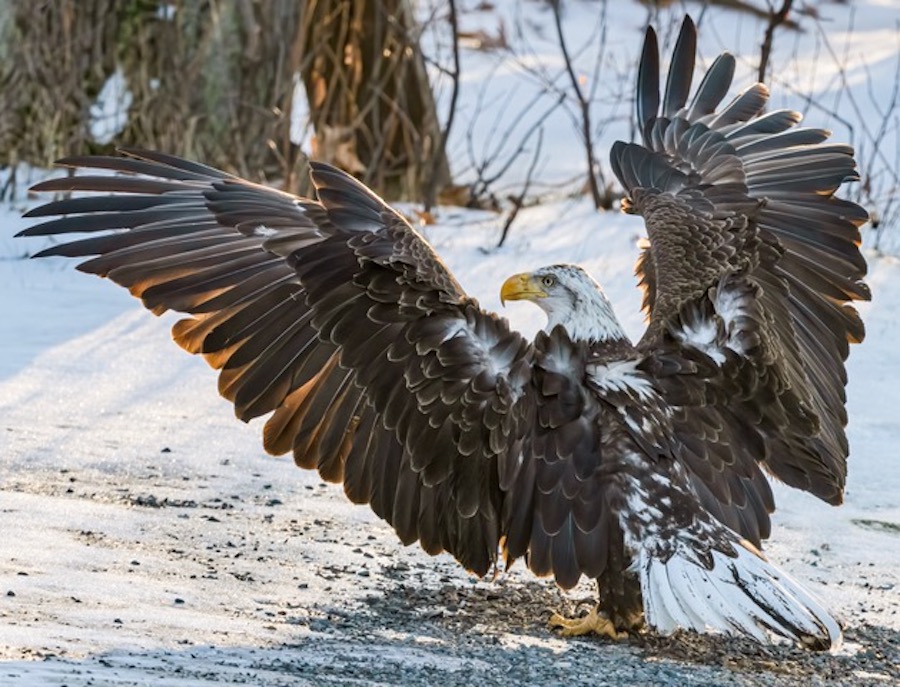
Will Authorities Step Up?
Courtesy of the Harvard Animal Law & Policy Clinic
A coalition of Massachusetts residents petitioned the Massachusetts Department of Agricultural Resources (MDAR) in May to suspend the registrations of anticoagulant rodenticide products that are killing eagles, owls, and other wild animals throughout the Commonwealth. The petition—prepared by the Harvard Law School Animal Law & Policy Clinic—was submitted on behalf of bird rehabilitators Erin Hutchings, Jodi Swenson, and Linda Amato of Cape Ann Wildlife in Essex; mammal rehabilitator Jane Newhouse of Newhouse Wildlife Rescue in Chelmsford; Marci Cemenska of Save Lexington Wildlife; James Joyce II and Patricia Sears-Joyce of Friends of Horn Pond in Woburn; and Laura Kiesel of Save Arlington Wildlife.
“Rodents are a key food source for birds of prey, so poisoning rats is a surefire way to kill owls and hawks too.”
“Rodents are a key food source for birds of prey, so poisoning rats is a surefire way to kill owls and hawks too,” says Lexi Neilan, a student in Harvard’s Animal Law & Policy Clinic. “We’re urging MDAR to step in to protect Massachusetts’ wildlife before it’s too late.”
Anticoagulant rodenticides are dangerous toxicants that prevent blood from clotting, causing victims to die of massive hemorrhaging. By design, these poisons kill animals slowly, with their effects setting in days after they’re consumed. Poisoned rodents return to the environment, where they may be eaten by predators who then also become sick. If found alive, these animals end up in the care of wildlife rehabilitators who try to save the animals through a round-the-clock regimen of vitamin K injections.
“Day after day, wildlife rehabilitators face the heartbreaking task of caring for birds choking on their own blood and sick foxes whose bodies seem too weak to recover,” adds clinic student Allyson Gambardella. “Rat poisons are wrecking the food web.”
In 2022 alone, Massachusetts commercial applicators used more than half a million pounds of anticoagulant rodenticides, yet MDAR does not appear to monitor rodenticide-related wildlife deaths. The voracious use of these poisons has grave consequences: tests commissioned by Cape Ann Wildlife have found rat poisons in the livers of dozens of patients in recent years, including hawks, owls, crows, a raven, a coyote pup, and red foxes. A recent study by the Tufts Wildlife Clinic reported that 100% of the 43 Red-tailed Hawks admitted over a two-year period tested positive for anticoagulant rodenticides.
The clinic’s petition argues that anticoagulant rodenticides fail to meet the Massachusetts Pesticide Control Act’s registration standards because they cause “unreasonable adverse effects to the environment.”
In a separate request, the coalition is also calling for the Executive Office of Energy and Environmental Affairs to investigate the impacts of rodenticides on species protected by the Massachusetts Endangered Species Act (MESA) and ensure that MDAR is using all practicable means to avoid damaging protected species.
“Anticoagulant rodenticides are threatening to undo decades-long efforts to protect species like the bald eagle,” says Lila Anderson, of Harvard’s Animal Law & Policy Clinic. “We have no choice but to remove these poisons from the environment, which means that we have got to stop feeding them to rodents.”
After pesticides decimated the Commonwealth’s bald eagle population in the mid-20th century, policy changes and reintroduction efforts have allowed this MESA-protected species to slowly recover. A few breeding pairs of eagles have even returned to the Boston area in recent years. However, since 2021 alone, four local bald eagles have died of anticoagulant rodenticide poisoning, including MK—a beloved Bald Eagle who nested in Arlington—and her daughter 25C.
“The federal government has found that rat poisons could push sensitive species to the brink of extinction,” adds clinic student Kira Horowitz. “We’re asking Massachusetts authorities to act now to ensure our native predators and scavengers have a chance at survival.”
As a result of litigation and legislation related to the impacts of rat poisons on native wildlife, the state of California has placed a moratorium on the use of certain anticoagulant rodenticides in the state.
Reprinted by permission of the Harvard Animal Law & Policy Clinic



Sorry, the comment form is closed at this time.